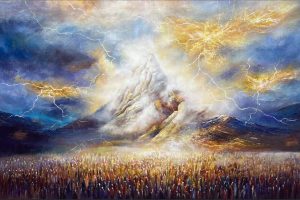The Cry That Still Echoes

Shalom from Yoel and Orly, founders
of Ulpan-Or, the International Center
for Hebrew and Israeli Culture Studies.
Hebrew at the Speed of Light!
“The Cry That Still Echoes – Torah Portion Toldot”
- The first human shout in the Torah — “צעקה / tze’akah / a cry-out”
- The second human weeping — “בכי / bechi / tears”—
Esav — The First Cry in Human History
When Esav discovers that Yaakov received the blessing, the Torah states:
And:

Jewish commentary explains that much of the worldly success later seen in Edom (אֱדוֹם / Edom) — Esav’s descendants — is attributed to:
· כיבוד אב / kibbud av / honoring one’s father
· צעקה / tze’akah / a cry-out from the depths of the heart
To this day, we live in a world where Esav’s cry is still felt.
Where Is God in a Cry?
Jewish mysticism teaches two foundational principles:
· “הצמצום אינו כפשוטו / ha-tzimtzum eino ke-feshuto / the divine ‘contraction’ is not literal”
· “לית אתר פנוי מיניה / leit atar panui minei / no place is empty of God”
Meaning:
· God is present in our actions, our prayers, and our goodness.
· He is also present inside our pain, our confusion, and our cries.
The Sages teach:
“Great is the cry — for it can tear up a harsh decree.”
Even when things feel impossible, tradition whispers:
“You still have somewhere to go: cry out to God.”
The deepest cry is often silent.
Where Not to Shout — And Where We Must
Where NOT to direct this power:
· toward children
· toward a spouse
· toward strangers
· toward the world in anger
That is the “Esav-side” of shouting.
Where SHOULD we direct it?
• תפילה / tefillah / prayer
“God, I can’t continue like this. Help me.”
• Learning and clarity
“Show me what You want from me. Open my understanding.”
• Love and joy
Moments too big for the heart to contain — at a wedding, a birth, or a breakthrough.
Esav’s Tears vs. Jewish Tears
Rabbi Nachman of Breslov teaches:
· Esav cried for lost privilege.
· A Jew cries from longing for closeness to God.
Rabbi Natan explains that בכי / bechi / tears are really רצון / ratzon / deep desire.
Thus:
· Esav’s crying = “You didn’t give me what I want.”
· Jewish crying = “I want You.”
When our tears come from yearning, we uproot Esav’s ancient cry at its source.
(Based on R. Vered’s lesson)
Modern Psychology on Crying
Modern psychology views crying not as a weakness but as a profound form of emotional truth-telling.
Dr. Judith Orloff, a psychiatrist who writes extensively on emotional health, explains that tears are the body’s way of releasing what the mind can no longer hold alone—a biological reset button that lowers stress hormones and restores a sense of inner balance.
Similarly, researcher Dr. Ad Vingerhoets, one of the world’s leading experts on crying, notes that tears serve as a signal of authenticity and vulnerability, helping us connect more deeply with others and with ourselves.
In this view, a cry is not merely an emotional overflow; it is a moment when the heart speaks the truth the mind has been whispering.
A Simple Story: “Abba! Don’t Leave Me!”
A child screams:
“Abba! Abba! Don’t leave me! Come back!”
And suddenly your whisper “Abba…” becomes a real cry.


· צעקה / tze’akah — cry-out from the depths
· בכי / bechi — a cry
Modern Hebrew expression:
Don’t cry over spilled milk

As we read about Esav’s ancient cry in Parashat Toldot, we cannot ignore the cries rising today from Israel (יִשְׂרָאֵל / Yisrael) — families waiting for missing loved ones, soldiers in danger, communities rebuilding shattered homes, and a nation struggling with uncertainty yet clinging to hope.
Jewish tradition teaches that צעקה / tze’akah / a heartfelt cry can open spiritual gates even when all seems blocked. In this moment of national pain and longing, every tear, every whispered “ה’ / Hashem / God, help us,” and every act of unity becomes part of a collective cry that lifts all of us.
May our personal and national tze’akah draw healing, protection, strength, and גאולה / ge’ulah / redemption for the people of Israel — speedily, gently, and in peace.

|
Now listen to a beautiful Israeli song
https://www.youtube.com/watch?v=ozySUaQao3Y&list=RDozySUaQao3Y&start_radio=1 Lyrics
Tears of angels. Quiet tears,
For when the angels weep
Tears of angels.
For when the angels weep… And we here, too,
Many ask us to redistribute our newsletters regarding Hebrew language learning and Hebrew insights.
By all means, please do feel free to forward this newsletter to anyone you wish! Login with your site account |





